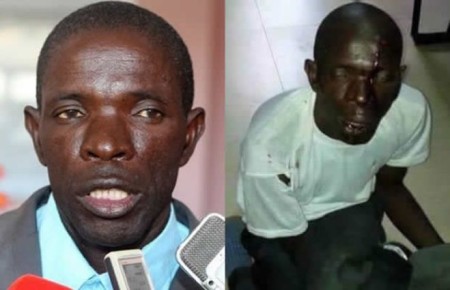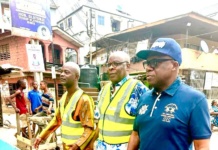
The trial for murder of the leader of a fringe Christian sect in Angola began on Monday (January 18) in the southern Angola city of Huambo.
Jose Julino Kalupeteka, leader of a millenarian sect called Luz do Mundo (Light of the World), is on trial for the murder of nine police officers who died during a security force operation to arrest him last year. However, critics claim that over a thousand of Kalupeteka’s followers were slaughtered by security officers in the same raid-turned-massacre.
On 16 April, 2015, police, who raided a compound on Mount Sumi near Huambo to arrest Kalupeteka on unspecified charges, were met by some resistance by his followers. At least one police officer was killed in the ensuing scuffle before the army was called in. What followed was a massive crackdown in which over a thousand of people are alleged to have died. Unfortunately, it is almost impossible to verify what happened because the mountain area has been sealed by the army since.
Angelo Kapwatcha, an Angolan professor and human rights activist, is compiling a report about those killed in the alleged massacre.
“We get more reports every day,” he said. “There may be up to 2,000 deaths.”
Kapwatcha and his team have analysed reports from several opposition politicians and journalists who visited the scene after the attack. Several soldiers who participated in the action also leaked videos to activists that show the clean-up of dozens of bodies.
The government, for its part, has only confirmed the deaths of 13 members of Luz do Mundo, who they say were “snipers” responsible for gunning down the dead officers.
Didier Pescard, a professor at the University of Geneva who has spent years researching Angola, doesn’t think that the alleged massacre will come up at Kalupeteka’s trial.
“The interest of the regime is to show that Kalupeteka is responsible for the deaths of those police officers. I would be surprised if the trial gave any time to the part of the story where hundreds of men, women and children probably died,” he said.
Already, the first day of the trial wasn’t looking good for Pastor Kalupeteka. Human rights activist Kapwatcha was at the trial in Huambo on Monday.
“The police did not allow us to enter,” he said. “The attorneys and the family of Pastor Kalupeteca did not enter. Even around court, there were soldiers so there wasn’t freedom. The atmosphere was not good.”
Mr Kapwatcha thinks that the trial is the government’s way of “putting an end to the church”.
Since the killings, the government has described church members as violent, religious fanatics. They’ve also linked the church to the opposition, UNITA, even though there is no evidence of this.
Pescard thinks that the church and its followers made the government nervous.
“I think that this trial and the massacre are the expression of a double insecurity. On the one hand, the success of the church itself is an expression of the feeling of insecurity for the rural population in Angola. The regime, on the other hand, fears anything that might look like civilian movements of rebellion.”
Luz do Mundo, which broke away from the established Seventh-Day Adventists church in Angola, may have brought together a large groups of people, but there doesn’t seem to be evidence that it was rebelling against Angola’s leading party, the MPLA, in any way.
Despite the high number of alleged dead and the many uncertainties around the trial, there has been little press about it. Paulo Ingles, a doctoral student in Germany who studies post-conflict Angola, said there were many reasons for this.
“There is a kind of indifference because it happened in Huambo. I think if this had happened in Luanda, maybe it would be would be different,” said Ingles, who is originally from the Angolan Central Highlands, where the incident took place. “Also, there is an economic crisis going on in Angola. Finally, the government controls information and many people believe what officials say about the church being full of fanatics.”
Neither has the trial been getting much international press. Many countries are currently forging economic ties with oil and diamond-rich Angola and are treading very lightly in terms of criticism on human rights issues.
The raids were launched as a part of a drive against fringe Christian church groups now illegal under new rules that require denominations to have 100,000 registered members spread across at least a third of Angola’s 18 provinces. Luz do Mundo is thought to have no more than 3,000 members.








